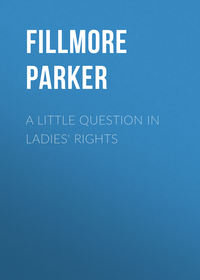 полная версия
полная версияThe Hickory Limb
This was said after they had reached the civilization of streets and houses, where their appearance caused a mild sensation. And small wonder. Margery's stockings were down in rolls about her ankles. Behind, her dress was gaping open where Henry had missed the buttons. In places there were yellow stains where the wet of her body had soaked through. Her face was streaked with mud and her hair was drying in a stiff mat that hung down heavily over her eyes. The once gorgeous hair ribbon was little better than a lump of mud.
Several little girls on different porches called out in amazed curiosity, "Why, Margery, what is the matter?" and a boy or two, staring hard, remarked, "Hello, Henry. What you doin'?" For all the attention he paid, Henry might not have heard. With lips tightly closed, eyes looking straight ahead, he rushed on, never once relaxing hold of his miserable victim's arm.
At their own gate they met the twins and Gladys Bailey just returning from their round of calls. One look at the strange pair, and even Gladys lost her air of blasé indifference. Her eyes opened wide and she took a deep breath of interest and surprise.
"Why, Henry," she said, "what in the world has Margery gone and done now?"
What has Margery gone and done now? If that wasn't like Gladys, before she knew a thing about it to decide that Margery had gone and done something! And when it was Gladys herself who was the cause of it all, anyhow! Remembering this, Margery turned on her and snarled like some angry little animal.
At this fresh token of savagery in his younger sister, Henry's face grew quite apoplectic with shame. But, still keeping his mouth closed, he pushed by Gladys and the twins, and dragged Margery up the steps of the front porch.
"Oh, look at Margery's hair!" Gladys called out in virtuous concern. "What has happened? You must tell us, Henry!"
Family shame might keep Henry's mouth closed, but Margery felt no such restraint. She wanted Gladys to know! She wanted everybody to know! So while Henry was freeing one hand of tin can and seine, preparatory to opening the door, she twisted around until she, could shout out the news to the listening world.
"I went in swimmin'!" she cried, shaking her muddied locks at Gladys. "That's what!" She had to hurry, for Henry was already pulling at the screen door. "With boys, too! With boys!"
Henry jerked her roughly into the house, but not before she had heard the beginning of Gladys's unctuous comment: "Oh, how disgraceful! Ain't Margery just too awful!" She also had time to realize vaguely that, disgraceful though it was, Gladys seemed in no haste to turn on the twins that cold glance of scorn which, by all reckoning, should instantly have been forthcoming. Why did she stay on talking to them? A cold doubt began to creep into Margery's mind. Had she, after all, disgraced only herself? The doubt slowly grew to a certainty, until, by the time she found herself dragged into the library, she felt as miserable and forlorn as she looked.
Without a word Henry placed her before her mother. Her mother raised languid eyes from a novel; then, like Gladys, showed livelier interest.
"Margery! What have you been doing?"
"Swimmin'." Henry answered for her, in the first syllables he had uttered since leaving the pond.
"Swimming!" repeated her mother faintly.
"With boys," added Henry gloomily.
"With boys!" echoed her mother, looking helpless and alarmed. The occasion was evidently one which demanded a well-chosen reproof. She paused a moment, then said impressively: "Why, I never heard of a little girl doing such a thing!"
At that all Margery's waning spirit flared up. It was what they always said! Whatever she did was bad, not because it was bad, but because she was a girl!
"'Tain't my fault I'm a girl!" she cried, stamping her foot and glaring out from under her muddy hair, more than ever like a little creature of the woods. "I don't want to be a girl! I want to be a boy, and you know I do!"
"That will do, Margery," said her mother coldly. "You may go to bed now, and when your father comes home, I shall tell him how you've been behaving and he can punish you. Henry, call Effie."
To Effie was intrusted the task of giving Margery a bath and putting her to bed.
"She's been a bad girl this afternoon, Effie, and if she's rude to you, you may spank her." And Margery's mother, thus shifting her maternal responsibility, first to a servant, then to her husband, returned to her novel with a troubled sigh.
When one is small and in the grip of adverse circumstances, there is, perhaps, no process of life which can be made more humiliating than a bath. In this instance, suffice to say that Effie was lavish in the use of soap and water, especially soap, and, by the time she finished, had reduced her charge to a state of quiescent misery.
Margery's room was the small front corner room adjoining her mother's. The window was open, and, as she lay in bed, feverish and unhappy, the murmur of conversation from the porch below reached her distinctly. She paid little attention until, hearing Gladys Bailey's voice, it suddenly came over her that that young woman had not yet gone home. Then Margery sat up and listened.
"I just feel so sorry for your poor father," Gladys's voice was saying. "He'll feel so disgraced!" After a slight pause she asked: "Don't you think he'll be home soon?"
So that was it! Gladys lingered on in hopes of witnessing the last scene of Margery's humiliation. Oh, what a deceitful creature Gladys was, pretending that the whole family was so disgraced, yet remaining still as intimate with them as ever! How horrid they all were – everybody except, perhaps – perhaps her father! In the past he was the only one who had ever shown himself superior to public opinion and circumstantial evidence. Would he be the same this time? If he, too, were going to be shocked and surprised, Margery felt that there was nothing left for her but to go off somewhere alone and die.
"How many boys did you say they was, Henry?"
Henry evidently had not said, for he did not answer now. Nothing daunted, Gladys went on.
"I suppose they was at least ten. Yes, I'm sure they must ha' been ten."
"No, they wasn't," Henry blurted out. "They was only five."
Margery tossed about on her little bed in helpless rage and scorn. Why, the creature was a regular Delilah!
"Who was they, Henry?"
Again Henry kept silence. But this time Gladys's question was answered in another way. From up the street came the various noises that announce the approach of a crowd of boys.
"Here they come now," Gladys exclaimed in candid satisfaction.
Yes, without doubt they were coming. When they saw Henry they began immediately a taunting sing-song:
"Oh, Henry, can't guess who I seen in swimmin'! Can't guess who I seen in swimmin'!"
Henry dashed off the porch and the chorus scattered in various directions. One saucy voice sang as it ran:
Motheh, may I go out to thwim?Yeth, my darlin' daughter;Hang your cloth' …Yes, that was the whole thing in a nutshell, Margery thought. It was exactly how they always talked to girls.
Hang your clothes on a hickory limb,And don't go near the water!Wasn't it what her mother said to her a dozen times a day? Now be a good little girl and have a good time. How could you be a good little girl and have a good time at the same time? The irony of it, when anybody with a grain of sense would know that the two do not go hand in hand! If she had stayed home that afternoon, she would have been good, but she would not have had a good time. As it was, she had had a good time, but she had not been good. So there you are!
The gate clicked, but it was not Henry, for Gladys offered the conciliatory greeting, "Hello, Willie." So it must be Willie Jones coming through their yard to get to his own. Margery wondered whether Gladys would be able to work him as she had worked Henry. Margery thought not, but if she were – well, she, Margery Blair, would have very little more to say to Willie Jones.
When, Margery judged, Willie Jones was passing the porch, Gladys asked in her suavest tones, "Oh, Willie, did you see Margery, too?"
For a moment Willie did not answer, and Margery, kneeling on the floor behind the window curtain, held her breath. Then, apparently without slowing his pace, Willie Jones grunted out in his roughest manner:
"Aw, go on! You don't know what you're talkin' about!"
"Willie Jones is just the rudest boy," Gladys informed the twins. "I wouldn't think your mother would let Margery play with him."
But, up-stairs, Margery wept for joy at this evidence of a true and noble heart.
Henry returned from the chase with the interesting news that he had almost caught Freddy Larkin.
"Well, I just pity your poor father," Gladys commented, "if he goes down on the car to-morrow with Freddy Larkin's father."
"Why, Gladys?" chorused the twins anxiously.
"Because he'll laugh at your father and make fun of him for having a girl that went in swimming with boys. Just you see! And your father'll feel so disgraced!"
Would he really? Margery wondered forlornly. Of all her family, her father was the one, the only one, she would have spared; and now, if Gladys were to be trusted, he it was who would suffer most. With a pang, she suddenly remembered how many times in the past she had been sent to bed, as to-day, to await his coming, and how kind and just he had always been, never pronouncing punishment until he had sifted and weighed the evidence against her. And, remembering this, her rebellious little heart softened and a sense of regret came over her – the first she had felt that afternoon. Why, why had she not remembered him sooner? How could she ever have forgotten him?
In the midst of this incipient remorse, Gladys announced his arrival.
He came in with a cheerful, "Hello, kidlets!" and almost immediately asked, "Where's Margery?"
"Margery's in bed," Henry said significantly.
Margery heard her father pull over a porch chair and seat himself.
"She's been bad," Katherine said.
Still her father made no comment.
It was Alice's turn to speak, and there was nothing left to tell but the deed itself.
"She went in swimmin'," Alice whispered.
And then, of all things, as Gladys Bailey would say, what did her father do but laugh! He laughed loud and long; but the others, evidently surprised, did not join him.
It was Gladys who spoke first.
"You forgot to tell your father that she went in swimmin' with boys."
"With boys!" her father echoed, and laughed harder than before.
Up-stairs, her head pressed against the window-sill, Margery could scarcely believe her ears. Did he really think it was funny? And then she had it. Her father was pretending! But that, after all, was only half a clue. Why was he pretending? Why?
He stopped laughing after a time and began putting questions to each of them in turn, until he had pieced together the whole story.
"Katherine," he asked finally, "why did you and Alice not take her with you when you went calling? If you had, this would not have happened."
"Well, you see, papa," began Katherine, "she's too little for our crowd."
"Too little? What nonsense! She's not a bit too little."
"Well, Gladys says she is," Katherine insisted.
Gladys corrected this statement kindly but firmly: "What I said was, that, for first calls, four was perhaps too big a crowd."
"Oh, I see. That is very different. No doubt Gladys is entirely right. But you've made your first calls now, haven't you? – and hereafter Margery can go with you just as well as not, can't she, Gladys? Why, you know, really, in crowds, the more the merrier. Besides" – and Margery knew just as though she were there the kind of look her father was giving Gladys – "as a favor to me!"
Gladys was completely taken in.
"I'll be glad to do anything I can for you, Mr. Blair," she said politely. Then she added gratuitously: "Everybody ought to be kind to each other."
"That's it, exactly. As Gladys says, the big boys and girls should always be kind and gentle to the smaller ones. Now Henry was right, when he found his little sister doing something wrong, to bring her home. But next time he's going to be more gentle about it, aren't you, Henry?"
Yes, Henry was, and Margery hugged herself in wonder and amazement. Why, her father was simply workin' 'em for all they was worth! He was just jollyin' 'em to beat the band! And it was all for her sake, too! Under the magic of his words, already they were ceasing to regard her as an outcast. And Margery, like many another who has sought to overturn the pillars of society, was strangely happy at the thought of being able once again to mingle with her own kind.
"But, papa," she heard Alice ask, "what'll you say to Freddy Larkin's father on the car?"
"What will I say to Freddy Larkin's father on the car, Alice?"
"Yes, papa, when he – Gladys – she says he'll make fun of you on account of Margery."
And then her father rose to the occasion magnificently.
"What will I say," he repeated in a loud, full voice, "to Freddy Larkin's father when he makes fun of me for having a little girl who went in swimming with the boys?"
He paused impressively, and suddenly Margery understood. He was the only one of them all who knew that of course she was listening! And he had known it all along and had been sending messages, no, not of excuse for her naughtiness – they would have that out together, later – but of love and encouragement for herself. Oh, how she would try never to grieve him again!
"I'll tell you what I'll say," his adorable voice continued. "I'll say, 'Well, I just bet you a great big round dollar that Freddy will never see Margery do such a thing again!' Why, do you know, Gladys, I'd be willing to risk five dollars!"
Then he came into the house and her mother kept him a moment in the library. She could not hear what her mother said, but her father's answer, "Of course I shall be severe, if necessary," put a sudden chill on her heart.
Then she heard his foot on the stairs; and she buried her face in the pillow, pretending to be asleep.
Her father stood over her a moment, looking down at her quietly. She could feel him looking. Then he said, "Margery," softly, gently. It seemed to her that she had never heard her name pronounced so sweetly, so lovingly. Whatever little ice of rebellion had formed anew around her heart melted that instant, and, like a whirlwind, she threw her arms about her father's neck and crushed her chill little nose and her burning face against his cheek. There she sobbed out her love and repentance.
"And papa – papa," she gasped as soon as she could speak, "you can bet him ten dollars if you want to, and you won't lose! I promise you, papa, you won't lose! You won't!"
Her mother supposed that, as usual, Margery had cajoled her father into an easy mood, for, when she saw them an hour later, Margery was seated on her father's knee, quiet and happy. In all apparent innocence she was saying:
"And oh, papa! Ugh! It just squashes up between your toes like worms!"






